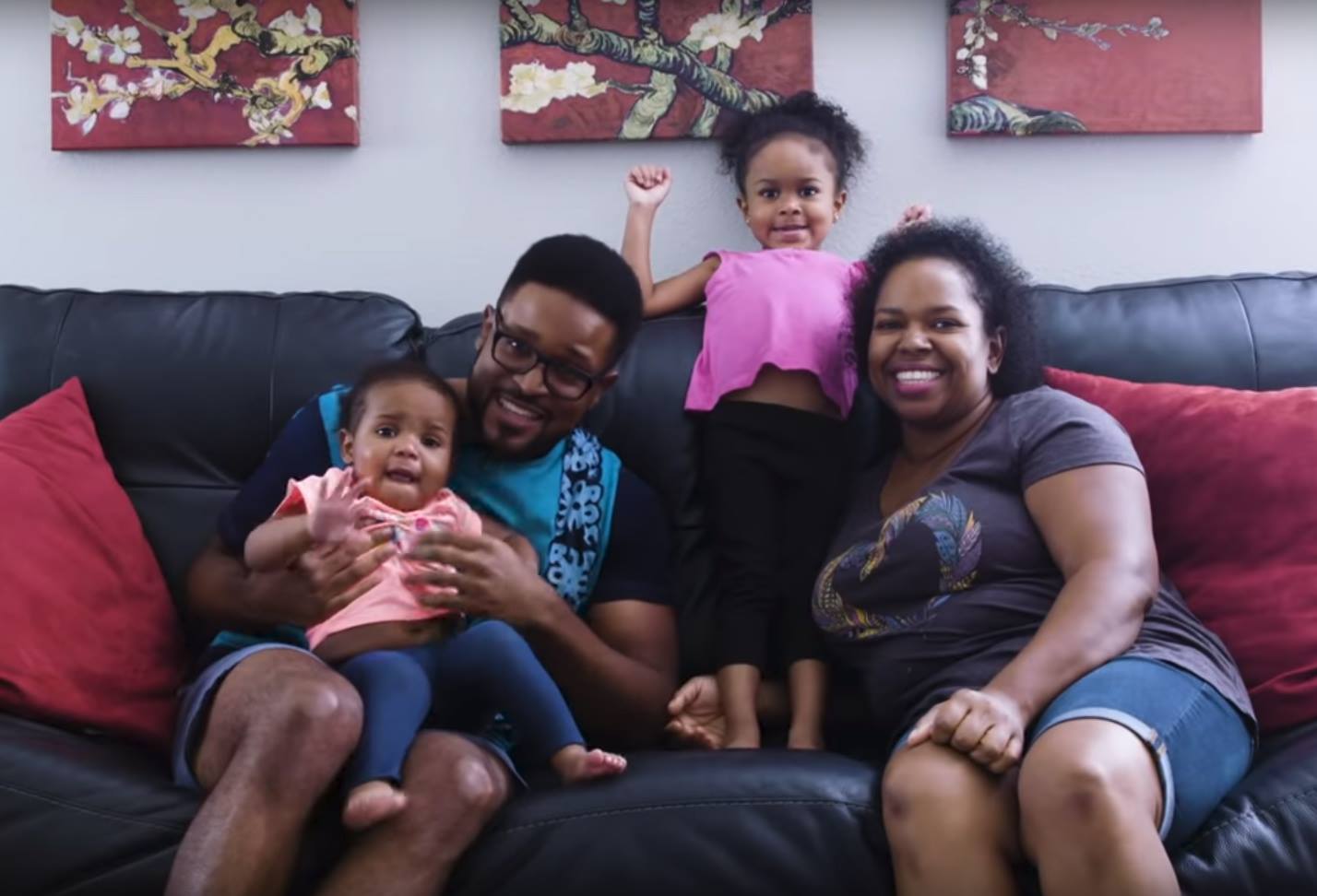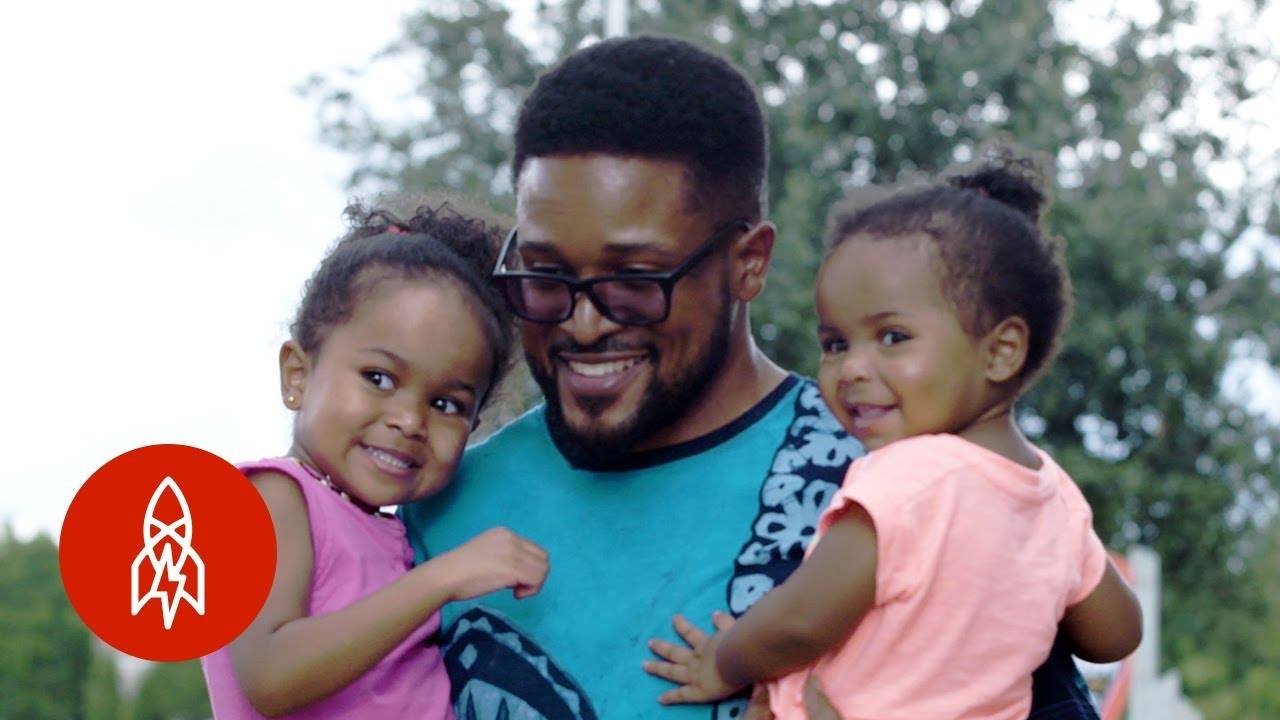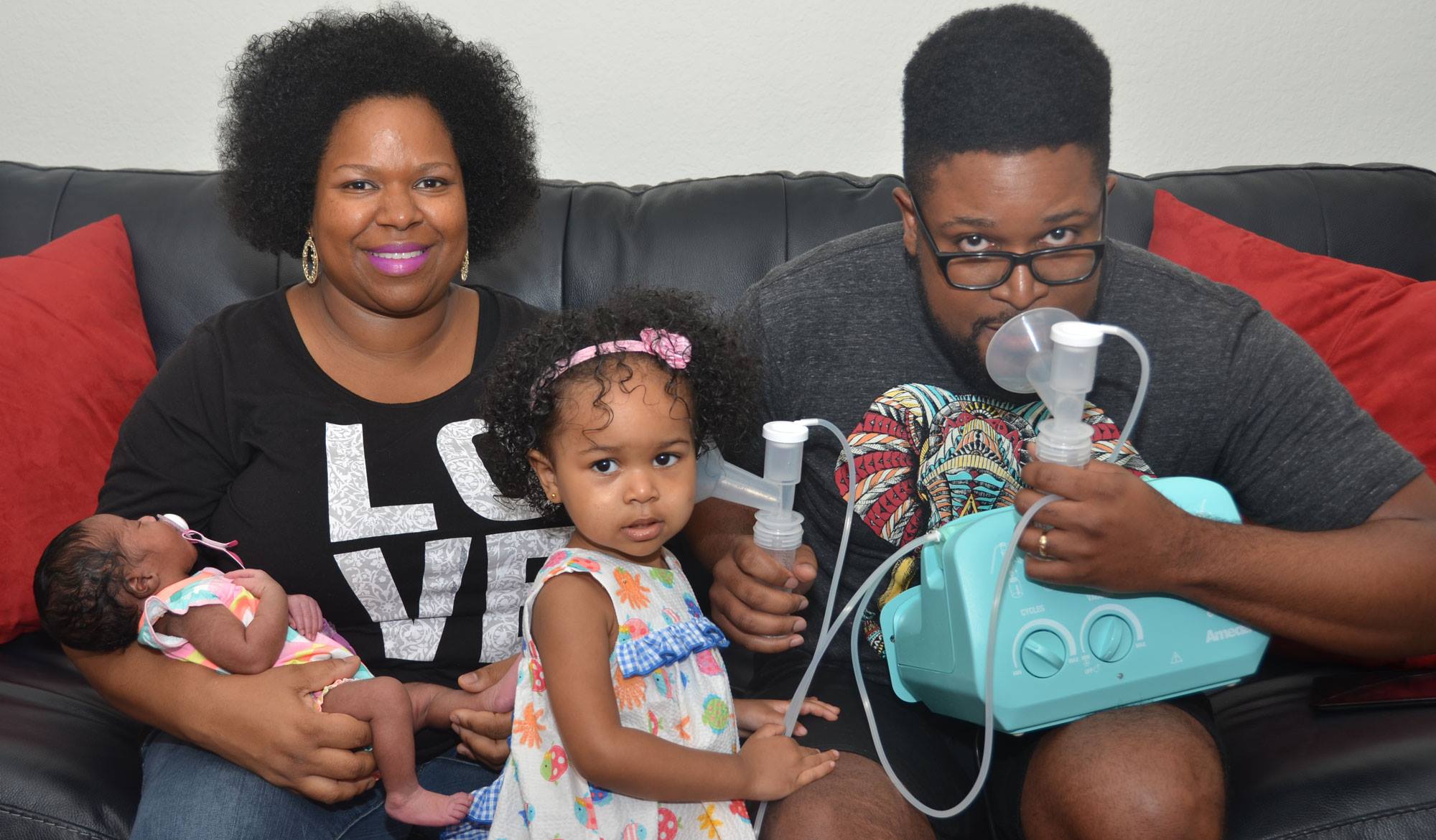
Source: LaGuardia Cross / LaGuardia Cross
Many people know La Guardia Cross for his hilarious “Interview With a Toddler” series. It’s that series that has helped Cross amass a YouTube following of nearly 300,000 subscribers. Viewers tune in to watch hilarious family shenanigans in Cross’ adventures as the father of two young daughters, ages four and two. Most of Cross’ videos are light-hearted and funny. However, life gets real even for the most hilarious among us, and in Cross’ case, sharing the news of his wife Leah’s depression was hard to share but necessary.
Last month, Cross posted a video about his wife being in the hospital following a suicide attempt, and then another video where both husband and wife appeared with an update about Leah’s health and life-long struggle with depression. The Tampa, Fl-based couple, who have been married for almost 13 years, is committed to tackling depression head on and to educating people about how they deal with it as a way to remove the stigma. MadameNoire caught up with LaGuardia Cross to chat about how he has learned to spot when his wife is in crisis, and the steps they take as a family to make sure she gets the help that she needs.
MadameNoire (MN): Was your wife open with you about her struggle with depression when you first started dating and can you recall one of the first times when you realized how serious it was?
LaGuardia Cross (LC): I can say yes because back in that time I just wanted to know everything [about her]. Even with the naive ignorant mind that I had about stuff, I was just in that state like, I love you, I want to know everything. Then when she told me, it was like, “Woah, what do I do with that?” But I was just seeking to know everything about her so I was trying to be a counselor too. I was trying to fix everything.
I saw it back then as, “Oh she’s sad, oh she’s sad again, oh she’s said again.” I saw the pattern but I don’t know if I understood the depth of what it could be. It may have been a couple of years of me just thinking that enough talks or maybe some prayers would make her snap out of it. I was still very ignorant to the way it worked and so it’s like I knew it was serious but I thought the remedy was a lot more simple than, probably when we got to the point of medication, or the first time that she really was trying to you know—
MN: Consider taking her life?
LC: Right.

Source: LaGuardia Cross / LaGuardia Cross
I was watching one of your videos and there was a quote that you said that really stuck with me, where you said, “It’s hard to love somebody into self-love, and it’s hard to convince them that they have value and worth when they don’t feel like they have it themselves.” So, as a partner, what does that feel like for you, how does that feel watching someone you love go through depression?
LC: It has taken me a long time to realize that it’s not her. That it really is a condition of its own. It is an illness of its own that I’ve kind of had to separate from her over time cause it just feels, why isn’t this getting any better, like why is she believing in a lie if I’m telling her all these good things and the things I see and the potential, and all this stuff? Why is that not clear? And even in conversations, I’ve had with her, I could look like the one that is off. There’s something wrong with what I’m saying because what she feels is the truth so there’s something wrong with me if I’m willing to take that, accept that and even stay in the relationship. So it can make me feel helpless if I’m trying to solve it all on my own.
MN: Your videos are known for the comedic elements of parenting, what made you decide to start revealing your wife’s struggle with depression?
LC: Because I was so open to making fun of myself. That’s kind of what the main part of the journey was to show and poke fun off, like here are the real mistakes I’m making, here’s the things that I’m trying to learn and in the comments, there would be so much support for it or, “I can relate,” or, “Oh my gosh that’s my kid too!” I would always spend time in the comments trying to communicate with folks because I was used to having a channel where only my friends and people I knew in real life would come and watch. So even as things grew I still treated it that same way and something I would hear a lot was, “When I feel down I watch this,” and “When I’m sad I watch this.”
So when that moment came up, I felt like I should share it because there’s a lot of people out there going through things that I don’t really know so it gave me a little hope. I wasn’t sure though, I was concerned that I didn’t wanna put Leah out there, and then just have people coming through with judgments and all these hard feelings but I just felt like, there’s so much [more] love that I should try it. Since the response was so warm and loving and welcoming and accepting, that’s what made me really open, like the first time I told them that she had to go into treatment and she was wanting to take her life.
MN: Did postpartum depression ever come into play for Leah, because that’s a completely separate beast?
LC: We’re still in the aftermath of all of that now so the fact that it was already there when our first daughter was born; it didn’t come up until nine months after. We thought everything was cool. We still stayed on medications during pregnancy. Then it just came in like a wave after birth. She had to increase her medications; she went back into counseling. I guess the only difference in it I can say is that since she was already dealing with it at that point, the psychiatrist was already there, the counselor was already there and we had already been told that there’s a potential this would come up just because she’s already dealing with depression.
The resources at least at that time were able to be there. Then I think having the second child—there are complications that came from that too. So, I feel like now we’re in that aftermath of all the chemical changes, body changes and how all of that has affected her. I feel like it’s a mixture of the depression that she knew beforehand, it has been heightened to a certain point now with the birth of her kids. Even today she met with a psychiatrist just to see about changing the medication and seeing what other options are out there because it has been hard to find the right fit after the kids even though this was a medication that worked before the kids came.

Source: LaGuardia Cross / LaGuardia Cross
MN: What was the process of finding a psychiatrist like and are her sessions covered by insurance? I know that’s a big one because a lot of doctors might not take insurance and the costs can be expensive.
LC: It is. Within this past year, I’ve kind of gotten to the point where it’s just whatever I have to do that she can live and thrive and have what she needs, [that’s] the approach that I’m taking, even though at times that can hurt the pockets. The money can be tighter because of those things and when we first moved to Tampa, I can say we based things solely on the insurance, and we were making phone calls to see who was available. There were a whole lot of psychiatrists who were like, “We’re not taking [new] patients.” So the first one that was available was who we go to. That’s the one that’s like a nurse practitioner, not really a psychiatrist and then they send her on a rollercoaster of new medications that are meant to treat bipolar when that’s not really her main issue.
She’s just going up and down and experiencing side effects that she’s never had. I remember having to pull on the side of the road so she can throw up [due to medication] and then she would have just different wild things that would happen to her that were not normal and that was just based upon only trying to use our insurance. It took friends of ours in the area, since we were new, to recommend a couple of folks, and so we would try them. I can say now the place that we go to is not covered by our insurance.
It really just came down to, let’s try this place. It just happened to be a place that was a mixture of traditional medicine mixed with more holistic things. We need something that’s gonna help. I don’t even know how to explain to another person, like how do you say, “Money’s not an object, but it is?”
So we’re just kind of in that spot and it seems like now, based upon how things are being moved around—the psychiatrist and the counselor that we have are moving to another office and they will take insurance there. So it seems like we may be able to get them under our insurance. But that is the dance.
MN: The other part to this is your children. The four-year-old is probably more in tune when mommy’s not feeling so well so how do you approach explaining what’s going on?
LC: Her knowledge of it is she understands that there are times that mommy needs to rest. She knows that when mommy is going into treatment, she went to the hospital, and the hospital is a place that you go to when you’re sick or you need help. So she understands that but we haven’t had a talk like, “This is what mommy deals with specifically and this is why sometimes she’s sad,” But she’s able to still, even at four, she can pick up on things. I’m not really trying to hide it from her. It’s just picking the right time.

Source: LaGuardia Cross / LaGuardia
MN: What advice do you have for other families who are going through it? How can people cope and find help for loved ones?
LC: It’s something that the whole family goes through at the same time. It is something that you can’t help but be involved in. My main role is to support and to love but not feel the pressure of having to fix everything and to have the right words. That’s why I’m glad she has a counselor and a psychiatrist, and it’s just about being proactive, even if you don’t want to be. I’m so laid back most of the team, but I have to have faith that things will work out. But I can’t always just sit back and wait for things to work.
I’ve had to be very vigilant, pay attention, know when things are at crisis mode, and be ready to take her to the hospital. It’s really just about paying attention and being willing to help somebody get help so that you don’t hold the burden of everything on your own. The support of family is priceless. I don’t know what I would do without the grandparents around or anybody. It’s just one of those things like, forget pride, take pride flush that down the toilet. Do not feel shame. Even though there are some family members that are just not the ones to reach out to—you gotta know the ones that are [supportive] and don’t feel bad to ask for help, even if you’re asking for it again, and again, and again because it’s not meant to be dealt with alone.
There are resources for people who are suicidal or depressed visit suicidepreventionlifeline.org or check out apps like Talk Space (for therapy) or Stay Alive.









